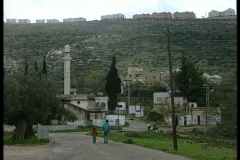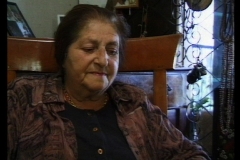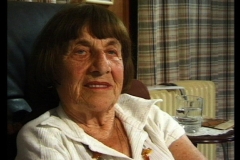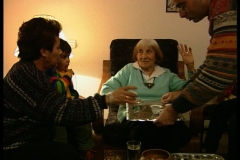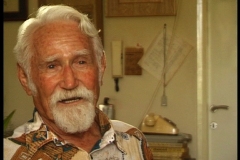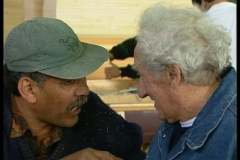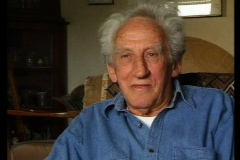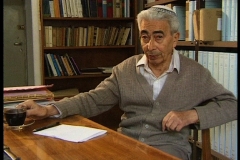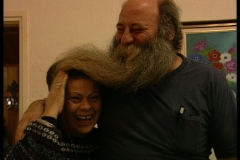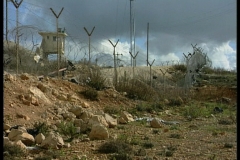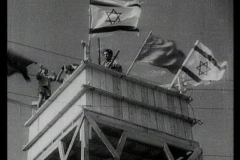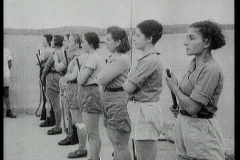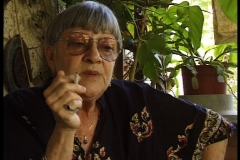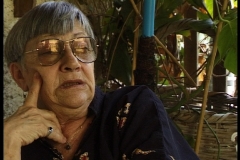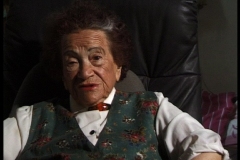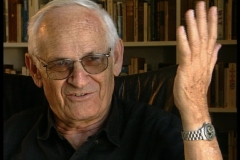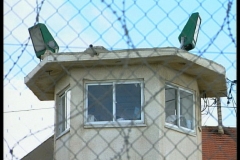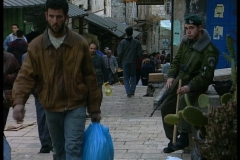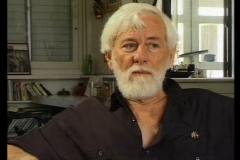Watch the film on Vimeo!
Our film is about Jews from Germany and Eastern Europe who, as young men and women, emigrated to Palestine in the thirties, under the influence of the Zionist movement, and helped to found the State of Israel. These men and women pushed for a peace agreement with the Palestinians as early as the forties and fifties, at a time when such activity was still regarded as treason. The subjective memories of these nonconformists establish historical contexts of which very few people are aware, providing a fresh perspective. The life histories of the protagonists – and with them destinies of European Jews in this century – come across directly and vividly because of the forceful way in which the protagonists recount their memories and experiences.
CAST
Uri Avnery
Edda Tandler
Joel Tandler
Hannah Jeremias
Hans Lebrecht
Pnina Feiler
Shmuel Amir
Ruth Lubitsch
Joseph Walk
CREW
Director: Robert Krieg
Cinematography: Bert Oosterveld
Editing: Gesa Marten
Production: Eine WORLD TV Produktion
Distributor: Krieg & Nolte GbR
World Sales: Krieg & Nolte GbR
Robert Krieg studied sociology, journalism and ethnology and then worked as a lecturer at the Dortmund University of Applied Sciences and Arts and the universities of Osnabrück and Bielefeld. He worked as a sociologist for the Robert Bosch Foundation and the Ministry of Labour, Health and Social Affairs in North Rhine-Westphalia and conducted social science research projects on the topics of marginalisation and migration.
Since 1983 he has worked mainly as a documentary filmmaker in Germany, Europe, Latin America and the Middle East. In the 1990s he was a lecturer at the International School of Film and Television in San Antonio (Cuba) and, together with Dagmar Wünnenberg, directed a training project for radio and television journalism in the Palestinian territories funded by the European Union. In 1997, together with Monika Nolte, he founded an authors’ association and production for film, television and radio in Cologne.
He is a member of the Arbeitsgemeinschaft Dokumentarfilm and the Filmbüro NW, of which he was a board member from 1989 to 1992 and from 2007 to 2014. From 2016 to 2021 he was also a member of the Broadcasting Council of the WDR.
Almost fifty years after unsuccessful attempts to establish a state, after five lost wars and decades of displacement, self-delusion, humiliation and hatred, Palestinians are now seeing the founding of their own state come within reach for the first time. Fighting for and suffering with them during all these years was a small minority of the Israeli population who – although they never managed to grow into a large movement – left nothing undone to bring about a reconciliation between Jews and Arabs. I am talking about the handful of elderly Jewish men and women who have been fighting for the Palestinians’ right to self-determination, some of them for more than half a century.
Once young pioneers dedicated to the Zionist ideal of founding a Jewish state, most of them had emigrated from Eastern European countries and Germany in the 20s and 30s and settled in what was then the British Mandate of Palestine. For a greater part of these immigrants the notion that national self-fulfilment would lead out of a history of anti-Semitic discrimination and deprivation harmonized with concepts of utopian socialism: living off the fruits of one’s own labour on one’s own soil in a just and brotherly society.
But their humanistic convictions brought some of them into conflict with Zionist policies. They could not accept that the existence of the Arab part of the population of Palestine was being ignored and that Arabs were being driven from their soil. They met with a lack of understanding and open animosity for persistently warning others about the consequences of a forcible
marginalization of the Arab population.
The remembrances of these people open the book of history to a page without which it would be difficult to fully understand what has compelled Israel to finally decide to make peace with its Arab neighbors. They have been the catalysts who – in diverse forms, in parliamentary and extraparliamentary movements – have kept the idea of peaceful coexistence alive in the consciousness of the Israeli public. To let them tell their life stories would be to trace the historic events that have led up to the Middle East peace negotiations.
For the early pioneers of peace who I want to introduce in my film, hopes for a peace go hand in hand with the utopia of a just society. Looking back on their lives and their personal commitment, I asked them what life in Israel will be like in the era of peace and whether the Jewish values of humane and just egalitarianism will continue to be valid in the future Israeli society.
By way of montage, the narratives are interwoven. A series of individual destinies became the common experience of a generation. The women among my contemporary witnesses, for instance, were influenced by the pioneering spirit of the 20s and 30s, which allowed women a much more active role in society. By applying Fechner’s montage principle, I was seating my “protagonists together at an imaginary table, irrespective of time and space, by virtue of their alternating discourse on the topic. By means of this fictive dialogue, statements can gain additional force as they are complemented, explained or elaborated by others, or conflicting positions can gain contour as different opinions are juxtaposed.” (Egon Netenjakob on Eberhard Fechner’s montage).
There were situations in the lives of my contemporary witnesses that they all experienced in a similar way and that molded them.
These decisive experiences of existential significance constitute markers and turning points in the individual life stories and the general course of history. Using historical and new material, I want to document these breaking points and expose the images to the field of tension generated by descriptions from memory.
“Memory is not truth; after all memory changes continuously. It is not what has happened but what I imagine or want to have happened.” (Eberhard Fechner) By letting my witnesses tell their version of the history of Palestine and Israel, I want to depict reality as it was experienced by them subjectively. From the sum of subjectively experienced realities emerges the search for truth, the attempt to come one notch closer to reality.
Robert Krieg, Cologne, 1998
TALK (in german)
Discussion with Moshe Zuckermann and Irit Neidhardt after the film “I came to Palestine” by Robert Krieg on the docfilm42 platform on November 19, 2023.
With Robert Krieg, filmmaker, Moshe Zuckermann, historian, Irit Neidhardt, sociologist.
Discussion moderator and editing: Angela Zumpe.
PRESS
“I have fought for a Palestine free from occupation by the British, for a country where Jews and Arabs will live together and where no one thinks that anything will interfere with that,” explains Ruth Lubitsch, who is over ninety years old. As a member of the Communist Party, which was the only party in Israel open to Jews and Arabs alike, she can look back on more than 60 years of active commitment to Palestinian rights. Never before has the possibility of a peaceful solution to the Israeli-Palestinian conflict been so close as it is today – and yet she remains sceptical: “Unfortunately, I always think that I won’t live to see it”.
Born in Warsaw, Ruth Lubitsch belongs to a small group of like-minded Israelis who, when the state of Israel was founded 50 years ago, opposed the official myth that there was no Arab population in Palestine and that the Jewish settlers came to an empty land in the 1920s and 1930s. This did not make them popular. “We always swam against the current that was common here, so we were actually isolated enough in our views,” says Joel Tandler, who comes from a rich Croatian leather merchant family. In the 1930s, like many, he followed the call of the Zionist youth movement Hashomer Hazair and went to Palestine to found a Jewish state that would realise a just and brotherly society in which there was no discrimination. But “the picture postcard was much nicer than the reality”, he says today, looking back on the élan and hopes of the young immigrants.
Ruth Lubitsch and Joel Tandler are two of a total of nine contemporary witnesses, born in Germany and Eastern Europe, who look back on their decades-long struggle for reconciliation and a just peace between Israelis and Palestinians and with their memoirs tell a part of Israeli history that has long been hushed up by official historiography. These include Uri Avnery, who visited Yassir Arafat in besieged Beirut in 1982 and was to be charged with high treason for doing so. Or the 86-year-old Hannah Jeremias, who was never active in a political party and who, together with her husband, brought Jewish and Arab youths together as early as the 1960s to send them to international youth camps in Germany. Others laid down in front of Israeli tractors in the 1950s in order to confiscation of Arab peasants’ land. It is thanks to their tenacity that the Arab minority is no longer treated as second-class citizens in their own country and now enjoys equal rights. Nevertheless, they see little reason to let up in their struggle: “The closer we get to peace, the more resistance to peace will harden. And the closer we get to the goal, the more dangerous this resistance will become, and that is why we cannot rest. We simply have to be on guard,” says Uri Avnery.
FESTIVALS
14. Internationales Dokumentarfilmfestival München
München, Deutschland
30. April bis 9. Mai 1999
Flying Broom Women’s Film Festival Ankara
Ankara, Türkei
8. bis 15. Mai 2003
Middle East International Film Festival
Abu Dhabi, Vereinigte Arabischen Emirate
10. bis 19. Oktober 2008



